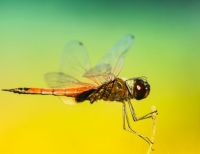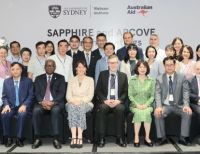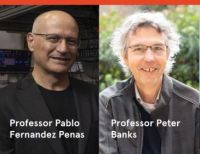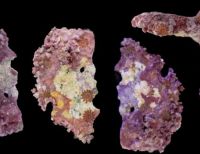
Professors Georgina Long and Richard Scolyer, NSW’s 2024 Australians of the Year.
University of Sydney Professors Georgina Long AO and Richard Scolyer AO, Co-Medical Directors of the Melanoma Institute, have won the prestigious NSW Australian of the Year award for their pioneering melanoma research and treatment.
The researchers were recognised at a ceremony in Sydney at the Museum of Contemporary Art for their world-leading work that has turned a diagnosis of advanced melanoma from a death sentence into a curable disease for many.
Their enduring partnership has saved thousands of lives from melanoma, known as Australia's national cancer, through immunotherapy treatments. Less than a decade ago, advanced melanoma was fatal. Thanks to Richard and Georgina’s immunotherapy approach, which activates a patient’s own immune system, it has become a curable disease.
In June 2023, when Richard was diagnosed with incurable grade 4 brain cancer, he and Georgina developed a series of world-first treatments based on their melanoma breakthroughs. Richard became the world’s first brain cancer patient to have pre-surgery combination immunotherapy. By undertaking an experimental treatment with the risk of shortening his life, he has advanced the understanding of brain cancer and is benefiting future patients. Richard has generated widespread public interest by publicly documenting his own cancer treatment and progress.
“I congratulate Professor Long and Professor Scolyer on this outstanding achievement,” said Vice-Chancellor and President, Professor Mark Scott.
“This award celebrates their pioneering research, their ongoing commitment and their leadership in transforming melanoma treatment and saving thousands of lives around the world. Their work is a true inspiration to us all.”
“We are honoured and humbled to receive the award of 2024 NSW Australian of the Year,” said Professor Georgina Long AO and Professor Richard Scolyer AO.
“This award is a tribute to the incredible teamwork at Melanoma Institute Australia, focusing on melanoma and now brain cancer, which is also impacting other cancers. We sincerely thank our team, our patients and their families and friends, and all those working to achieve zero deaths from cancer.”
















